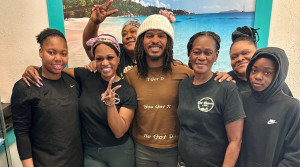But even with the rise of #SupportBlackOwned and other initiatives, there are still many Black entrepreneurs who worry about identifying as Black.
Zechariah Thomas, the founder of Oshawa-based business Swift Hockey, recently broke his silence about the fear that had long consumed him: openly acknowledging that his business, a hockey stick manufacturing company, was Black-owned. Thomas was driven by a mission to make stick purchases more affordable, especially for Black people so they could take part in the sport.
Having personally endured widespread racism as a player and being fully aware of the persisting racial bias in hockey leagues, Thomas knew that acknowledging his identity as a Black business owner would invite further discrimination. So he remained behind the scenes, until an appearance on Dragon's Den, where fellow Jamaican entrepreneur Wes Hall extended his support for Swift Hockey, and transformed Thomas's entrepreneurial journey.
Before the Dragon’s Den appearance, Thomas stayed in the back of the business as much as possible and let his white business partners take the lead. “I would be in the odd video, but I didn't post myself anywhere towards the brand. Dragon’s Den gave me no choice but to lean into what was happening. It's been hard trying to become that new person now.”
Thomas says Dragon’s Den was a really positive experience, but he suspects he lost some customers once it became known the business was partially Black owned.
When Thomas shared his insights on racism in hockey during a CBC News interview, the response was predictably hostile, with racist and unsupportive comments on Facebook. Thomas was dismayed but unfazed. "People just really do not understand that [racism] is still a reality... people were just thinking I was talking crap."
{https://www.instagram.com/p/C4yPOIVgw1a/}
Feyrous Beserat, an Eritrean immigrant who relocated to Saint John, New Brunswick, found solace in cooking at the Team Leader Centre at the age of 15. Despite facing discrimination because of her skin colour and limited English proficiency, sharing her culture through food became her medium of expression. Encouraged by the positive reception at the centre, she chose to pursue her passion for cooking further.
“I started catering at the Team Leader Centre and then people wanted to try new stuff. I was cooking my culture's food. The more people liked it, I realized that this could be an actual job,” says Beserat who continued to cater around the community, then participated in the Saint John Sunday Market. This was a dream come true for her since she attended every Sunday once she immigrated to the region.
As there were only a few Black people selling goods at the market, Beserat feared the response. After she applied and was approved to sell her food, some friends decided to help, including a white woman from the region who had more knowledge on navigating sales, the market and guided her on her application project.
When Beserat started selling at the market her and her friends were relatively young, and this woman helped them feel secure in their business model. But it was not lost on Beserat that having someone white at the helm of the business brought them more legitimacy.
While Beserat and her friends cooked, took the cash and stayed behind the scenes, the older white woman became the spokesperson and by proxy, the face of the company, encouraging members of Saint John who looked more like her to try the delicious Eritrean food. As she saw the dishes being made, this woman became well-versed in sharing the food Beserat and her crew were creating.
Eventually, Beserat came forward and shared that she was in fact the owner of Far Away Kitchen. She also recently won an Entrepreneurial Spirit Award at the Young Black Changemakers Awards presented by the Black Business Professionals Network of New Brunswick.
Beserat is now confident and proud of being a Black business owner. At 20 years old, she caters and runs a stall at the Sunday Market during the summer months all while studying to be a nurse. “There are a lot more Black people and people from my culture [in Saint John] than there used to be when we first came. It made it easier to connect and share the culture.”
{https://www.instagram.com/p/Cwiavl9u6KL/?img_index=1}
Karen Ferguson, a Toronto business owner, was always proud of being a Black business owner until she bought a business from someone else. Previous to owning the Toronto Designers Market located in the Holt Renfrew Centre, Karen owned the Port Credit Emporium in Port Credit. and had no issue being a Black woman who was the face of this business.
“I had no problem being the face of that business because that was initially my business from conception to execution. It was my vision. It was what I wanted to do. When I took over Toronto Designers Market, I felt that it was better to keep the previous owner as the face to allow people to transition. A lot of people thought I was already a part owner of the business but I noticed that they would still defer any important questions to the previous owner, as they had an existing relationship with him.”
It was only when Toronto Designers Market relocated to their current location that she revealed she had been the owner for some time.
In Toronto Designers Market, Ferguson features all Canadian designers, housewares, and brands with several being Black-owned, although that isn’t obvious or disclosed.
“I would rather customers just experience the brands, fall in love with the brands rather than disclose which brands belong to which cultures. I don't pull brands out and say, “This is a Black brand,” but by virtue of my face being the face of the company, people assume it is. Black customers always ask me, “Is this your business?” and I always answer in the positive. And then they will proceed to ask me which brands are Black-owned.”
With the previous owner being Chinese, Ferguson notes that there were more Asian brands when he was the face, and the original white owner also had more white brands in the store. Ferguson doesn’t believe this was intentional. She thinks it’s just that people naturally gravitate towards those who they feel represent them.
{https://www.instagram.com/p/C4yZGR-JuD4/}
“I guess that me being Black resulted in more Black brands feeling comfortable talking to me and thus more Black brands being in the store. It's a bit of a catch-22.”
Ferguson adds that since finally coming forward as the face of Toronto Designers Market it has been smooth sailing. However, one customer did suggest that Ferguson offer more ‘products from her country’ without knowing anything about where Ferguson came from. As Ferguson asked exactly what products she was looking for from ‘her country’ the customer realized her faux pas and could not articulate what she was looking for.
For Ferguson, the goal of her store is to show how diverse Canada is and have an assortment of goods from many cultures and groups without selling things based on culture. She hopes they see the goods in her store and try to imagine how they may fit in their home or wardrobe, not what race the person who created it is.

 By
By 





